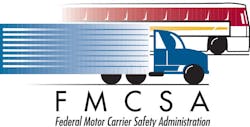Citing a June 3 blog post by Anne Ferro, Administrator of the Federal Motor Carrier Safety Administration (FMCSA), in its argument that truckers “can no longer be assured of respect from and fair treatment by the Administrator and the agency she leads,” the Owner Operator Independent Drivers Assn. (OOIDA) is petitioning the Dept. of Transportation to replace Ferro as the agency's chief.
In a June 5 letter to DOT Secretary Anthony Foxx, OOIDA president Jim Johnston said that OOIDA’s board of directors “has concluded that the FMCSA can no longer perform its regulatory and enforcement duties impartially, and we have thus lost confidence in Administrator Ferro’s ability to conduct her responsibilities (which go far beyond simply regulating and enforcing truck safety rules and regulations) effectively.”
Johnston said that while OOIDA and FMCSA had disagreed on policy, process and outcomes in a number of areas, they had always thought Ferro and FMCSA staff were “professionals working to do a difficult job balancing a number of complex responsibilities and perspectives.”
But he stated that Ferro’s recent statements – especially her post on DOT’s official blog “Fast Lane” – “spelled out clearly that FMCSA, and the Administrator herself, view truckers not as committed professionals but as accidents waiting to happen, and that the only way to prevent these accidents is through more rules, more enforcement and the continued treatment of truckers as a whole as if they are criminally negligent.”
In her blog post, Ferro had argued against potential Congressional action to block part of last year’s changes to the Hours-of-Service restart provision and cited several major accidents reported to FMCSA by victims’ families.
On June 5, FMCSA lost the first round in that fight when the Senate Appropriations Committee voted by a two-to-one margin to block enforcement pending a study.
“Her posting uses snippets of isolated accidents– tragedies yes, but situations that need far more explanation and context to understand than a few simple lines on a website– to oppose a regulation that OOIDA members and others within trucking have clearly stated have a demonstratively negative impact on their health, their incomes, their ability to spend time with their families, and on the safety of the driving public,” Johnston told Foxx.
Johnston also argued that FMCSA adopted the restart changes before it completed the field study as Congress had intended.
“Instead of speaking positively about the safety accomplishments of truckers, these types of outrageous comments exemplify an extreme bias against the trucking industry and truckers in general,” Johnston said.
“We can have strong disagreements over policy,” he continued. “However, the tone of this blog posting leads professional truck drivers to conclude that the Administrator feels they are actively seeking to cause accidents (or at the very least lack a commitment to safety) by opposing specific changes to the hours-of-service regulations.”
Johnston also charged that Ferro’s comments were intended to influence legislative efforts inappropriately and violated the letter and intent of federal law barring such actions by an administration official.
Johnston cited the blog post as just the latest of “a pattern of troubling statements” Ferro has made regarding the trucking industry.
For example, when questioned at a Congressional hearing in March about unintended consequences of proposed rulemakings, Ferro responded that she was “not hired to represent the industry,” Johnston told Foxx.
“While we can all agree that it is not the job of FMCSA to place industry interests above public safety, this kind of antagonism is not conducive to productive dialogue and indicates that Ms. Ferro does not welcome input from the very industry her agency regulates,” Johnston said. “This type of activism has no place in any government agency.”
In reply to a query on the matter, an American Trucking Assn. (ATA) spokesperson told FleetOwner: "While the industry is certainly justified in having serious concerns about Administrator Ferro's leadership and decisions, given recent dialogue she has initiated with ATA, we expect to have a more open, productive and fruitful relationship going forward that will result in safer highways for everyone."
UPDATE: A DOT spokesperson told FleetOwner on Saturday, June 7, that “the Department of Transportation does not think a letter like that deserves a statement.”
